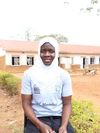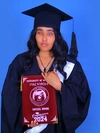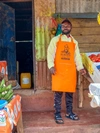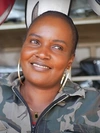Rose Ropani John
Opening Doors Through Education: Rose’s Journey Back to School

My husband encouraged me to study as much as I want and assured me that being a wife and mother shouldn't hold me back. This attitude is bold and rare for a South Sudanese man!
With such encouragement and the Accelerated Education Program (AEP), Rose is now in her first year of high school, studying with aspirations of becoming a nurse. She draws inspiration from her late father, a doctor.
Rose fled South Sudan as a child with her mother, siblings and relatives due to war, seeking safety and a brighter future. The transition was far from easy; Rose and her family faced numerous challenges in adapting to a new country and educational system.
Although she had completed two years of secondary school before leaving South Sudan, she lost her academic records amid the chaos of their flight. Lacking documentation, her only option was to retake the national primary leaving exams. Yet, the government's free schooling initiative had hidden costs that made it unaffordable for her family then. Consequently, Rose spent 2016 at home, struggling with the upheaval of leaving her life in South Sudan behind.
In 2017, she bravely joined the Ugandan educational system, hoping to catch up on her studies. Without her academic records, she enrolled in primary school, where she excelled. By 2018, she transitioned to Senior One; however, the age gap made her feel out of sync with her classmates, prompting her to pause her education.
Rose found love and married during this time, adding a new twist to her educational ambitions. Nevertheless, she remained determined to return to school. The arrival of her first child brought about the challenge of balancing motherhood and education. So, she stayed home to nurse the baby.
When the global pandemic struck in 2019, Rose had to once again pause her ambitions. Following the birth of her second child in 2020, her situation changed drastically. Nearly losing hope of returning to school, she found a program in 2023 that supports mothers in continuing their education while looking after their children. Excited, she enrolled in school, with crucial assistance from her husband during the registration process.
Throughout her journey, community support was crucial to Rose's story. Her mother-in-law stepped in to care for her children, which enabled Rose to concentrate on her education, as she had to join a boarding school due to the nature of the subject combination she was pursuing.
Rose expresses her desire to pursue nursing so that she can save lives. She recalls experiences in her settlement where she believes she could have made a difference with basic skills.
I understand that becoming a doctor is not an unattainable goal, but given my current circumstances, I have opted for nursing. It requires less time to study, and I can manage the small fees if I don’t secure a sponsor. At least it’s a medical field, and it keeps me close to my father’s legacy.
Accelerated Education Programs (AEPs) are shorter and more flexible than traditional programs. They are suitable for students of different ages and are designed to help students develop their learning abilities in critical subjects and earn elementary school qualifications.
In Uganda, the AEP curriculum has been developed in collaboration with the National Curriculum Development Centre to help out-of-school youth catch up with the standard national curriculum. Two years of lower secondary level now cover what was previously covered in four years, with Level One covering senior 1 and 2, and Level Two covering senior 3 and 4. After completing Level Two, learners can sit for National Examinations and qualify for the Advanced Level in mainstream education. This allows them to pursue formal secondary education and, in the long run, pursue careers of their choice.
Rose is among over 1,300 youth who have gone through AEP and are now enrolled in mainstream schools to finish high school and join a university. She is part of War Child Canada and Mastercard Foundation’s Bridge Project. This project aims to assist 20,400 refugee and host community learners in enrolling and completing the AEP curriculum by June 2027. It aims to increase access to market-relevant secondary and tertiary education and skills for refugee and host community youth.





